Exploring Strategic Choice and Deterministic Theories in Organizations
VerifiedAdded on 2023/06/04
|11
|2830
|258
Essay
AI Summary
This essay provides a comprehensive analysis of organizational theory, focusing on the contrasting paradigms of strategic choice and deterministic theories. The introduction establishes the significance of these theories in understanding organizational structure and goal achievement. The essay defines strategic choice, emphasizing managerial decision-making power, and contrasts it with deterministic theories like resource dependency, institutional theory, and population ecology. A comparative analysis highlights the strengths and weaknesses of each theory. The impact of strategic choice and deterministic theories on organizational actions is evaluated, considering factors such as resource management, adherence to institutional frameworks, and the influence of population dynamics. The essay concludes that both strategic choice and deterministic theories are compelling and essential for effective organizational behavior, advocating for an integrated approach that combines strategic thinking with the principles of deterministic theories to achieve optimal results. The essay uses a variety of sources to support its claims and is structured logically to facilitate understanding.
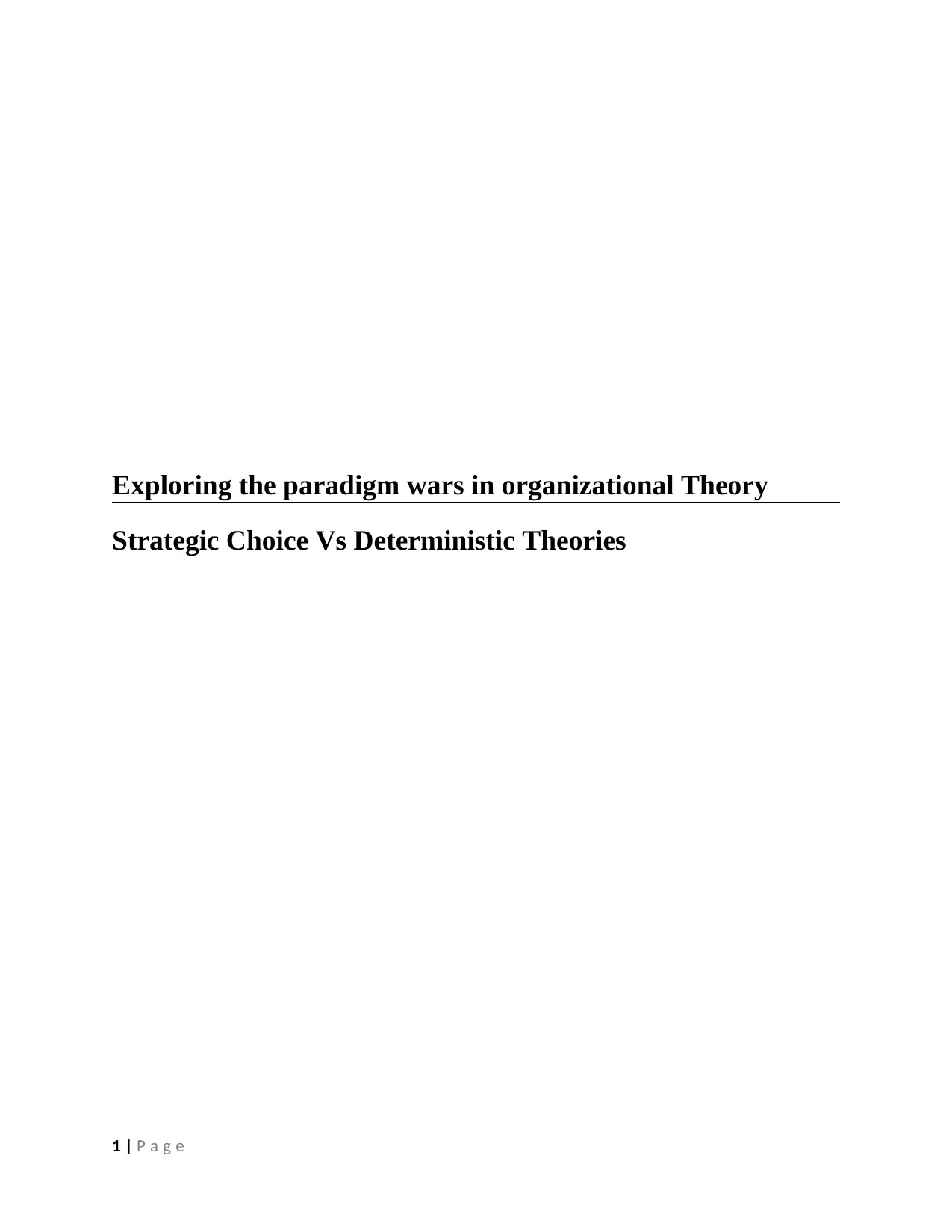
Exploring the paradigm wars in organizational Theory
Strategic Choice Vs Deterministic Theories
1 | P a g e
Strategic Choice Vs Deterministic Theories
1 | P a g e
Paraphrase This Document
Need a fresh take? Get an instant paraphrase of this document with our AI Paraphraser
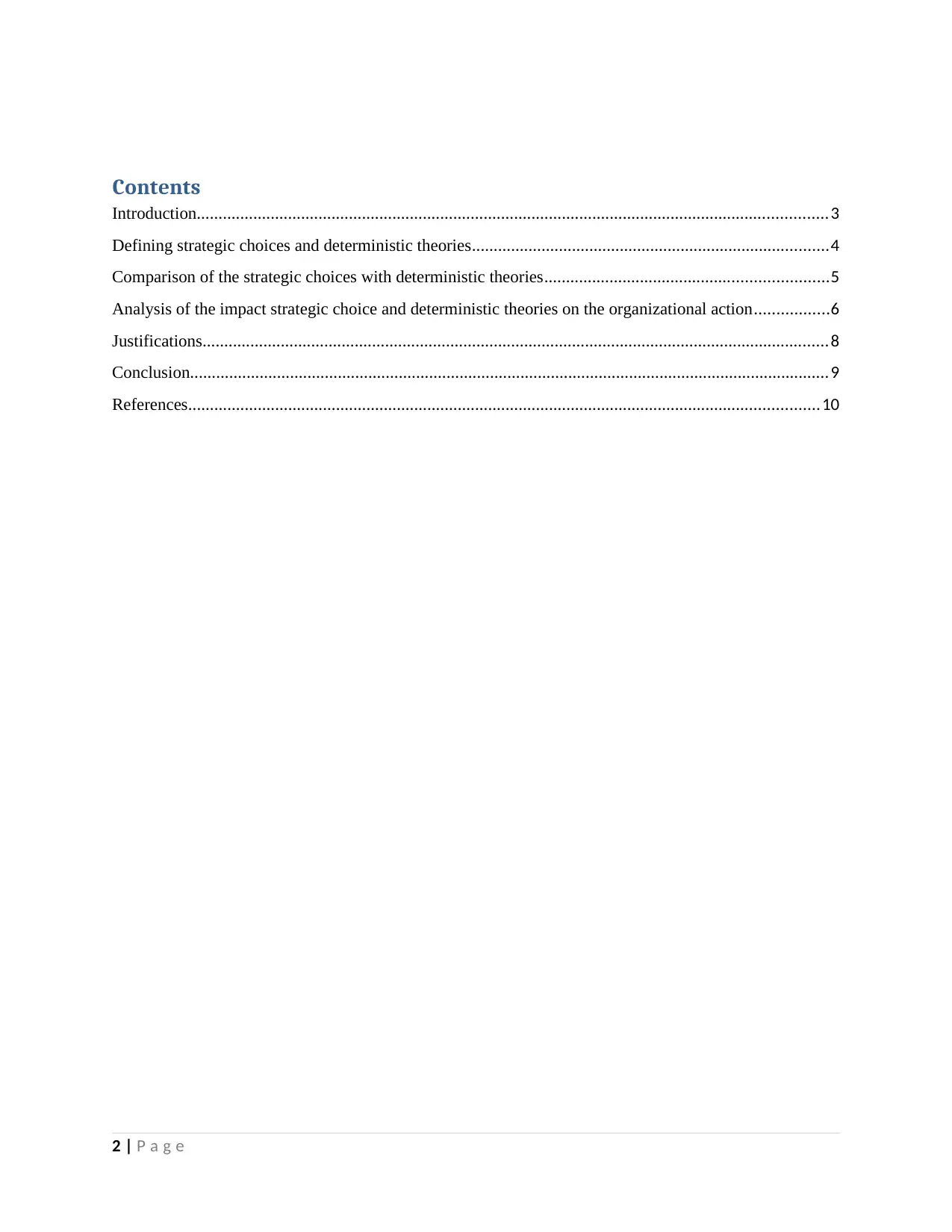
Contents
Introduction.................................................................................................................................................3
Defining strategic choices and deterministic theories..................................................................................4
Comparison of the strategic choices with deterministic theories.................................................................5
Analysis of the impact strategic choice and deterministic theories on the organizational action.................6
Justifications................................................................................................................................................8
Conclusion...................................................................................................................................................9
References.................................................................................................................................................10
2 | P a g e
Introduction.................................................................................................................................................3
Defining strategic choices and deterministic theories..................................................................................4
Comparison of the strategic choices with deterministic theories.................................................................5
Analysis of the impact strategic choice and deterministic theories on the organizational action.................6
Justifications................................................................................................................................................8
Conclusion...................................................................................................................................................9
References.................................................................................................................................................10
2 | P a g e
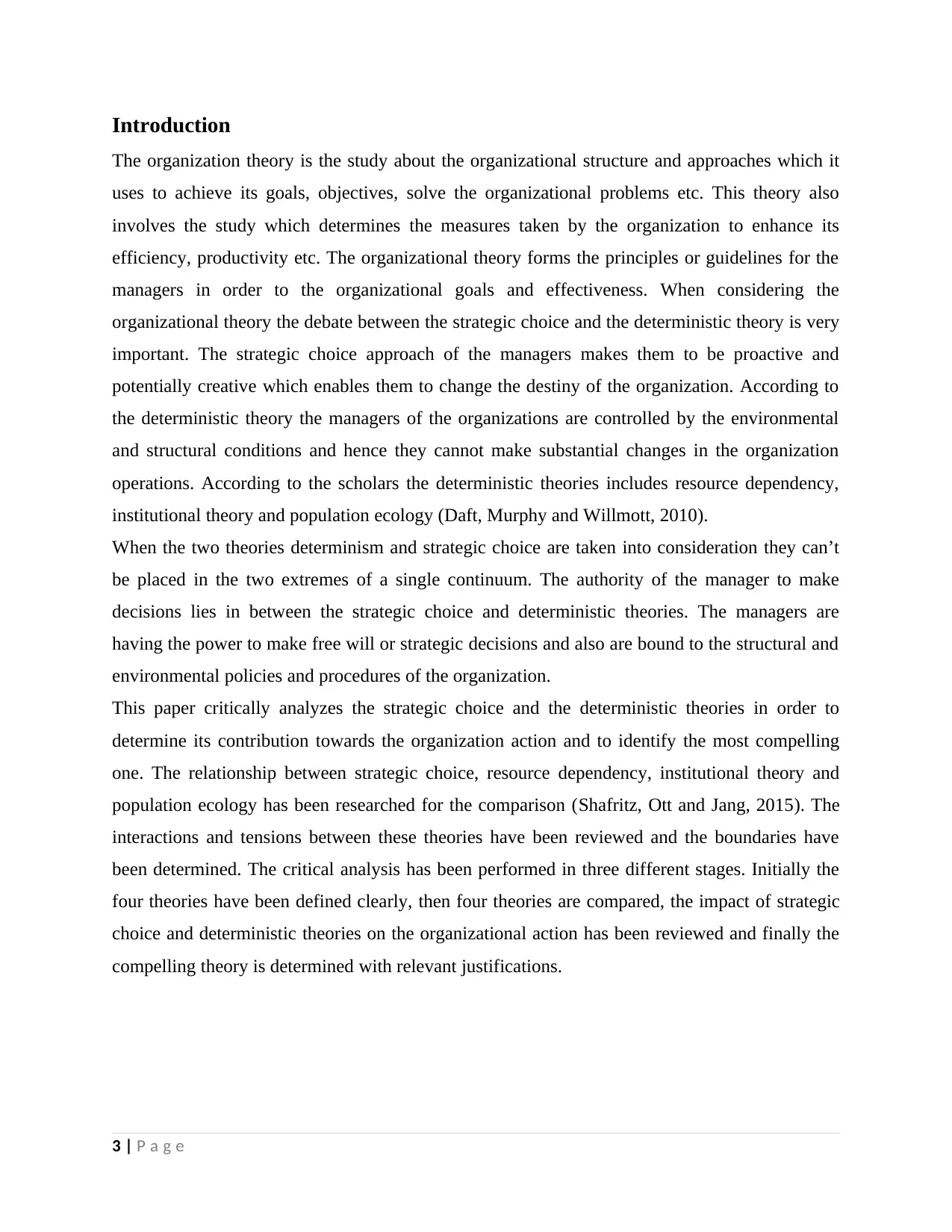
Introduction
The organization theory is the study about the organizational structure and approaches which it
uses to achieve its goals, objectives, solve the organizational problems etc. This theory also
involves the study which determines the measures taken by the organization to enhance its
efficiency, productivity etc. The organizational theory forms the principles or guidelines for the
managers in order to the organizational goals and effectiveness. When considering the
organizational theory the debate between the strategic choice and the deterministic theory is very
important. The strategic choice approach of the managers makes them to be proactive and
potentially creative which enables them to change the destiny of the organization. According to
the deterministic theory the managers of the organizations are controlled by the environmental
and structural conditions and hence they cannot make substantial changes in the organization
operations. According to the scholars the deterministic theories includes resource dependency,
institutional theory and population ecology (Daft, Murphy and Willmott, 2010).
When the two theories determinism and strategic choice are taken into consideration they can’t
be placed in the two extremes of a single continuum. The authority of the manager to make
decisions lies in between the strategic choice and deterministic theories. The managers are
having the power to make free will or strategic decisions and also are bound to the structural and
environmental policies and procedures of the organization.
This paper critically analyzes the strategic choice and the deterministic theories in order to
determine its contribution towards the organization action and to identify the most compelling
one. The relationship between strategic choice, resource dependency, institutional theory and
population ecology has been researched for the comparison (Shafritz, Ott and Jang, 2015). The
interactions and tensions between these theories have been reviewed and the boundaries have
been determined. The critical analysis has been performed in three different stages. Initially the
four theories have been defined clearly, then four theories are compared, the impact of strategic
choice and deterministic theories on the organizational action has been reviewed and finally the
compelling theory is determined with relevant justifications.
3 | P a g e
The organization theory is the study about the organizational structure and approaches which it
uses to achieve its goals, objectives, solve the organizational problems etc. This theory also
involves the study which determines the measures taken by the organization to enhance its
efficiency, productivity etc. The organizational theory forms the principles or guidelines for the
managers in order to the organizational goals and effectiveness. When considering the
organizational theory the debate between the strategic choice and the deterministic theory is very
important. The strategic choice approach of the managers makes them to be proactive and
potentially creative which enables them to change the destiny of the organization. According to
the deterministic theory the managers of the organizations are controlled by the environmental
and structural conditions and hence they cannot make substantial changes in the organization
operations. According to the scholars the deterministic theories includes resource dependency,
institutional theory and population ecology (Daft, Murphy and Willmott, 2010).
When the two theories determinism and strategic choice are taken into consideration they can’t
be placed in the two extremes of a single continuum. The authority of the manager to make
decisions lies in between the strategic choice and deterministic theories. The managers are
having the power to make free will or strategic decisions and also are bound to the structural and
environmental policies and procedures of the organization.
This paper critically analyzes the strategic choice and the deterministic theories in order to
determine its contribution towards the organization action and to identify the most compelling
one. The relationship between strategic choice, resource dependency, institutional theory and
population ecology has been researched for the comparison (Shafritz, Ott and Jang, 2015). The
interactions and tensions between these theories have been reviewed and the boundaries have
been determined. The critical analysis has been performed in three different stages. Initially the
four theories have been defined clearly, then four theories are compared, the impact of strategic
choice and deterministic theories on the organizational action has been reviewed and finally the
compelling theory is determined with relevant justifications.
3 | P a g e
⊘ This is a preview!⊘
Do you want full access?
Subscribe today to unlock all pages.

Trusted by 1+ million students worldwide
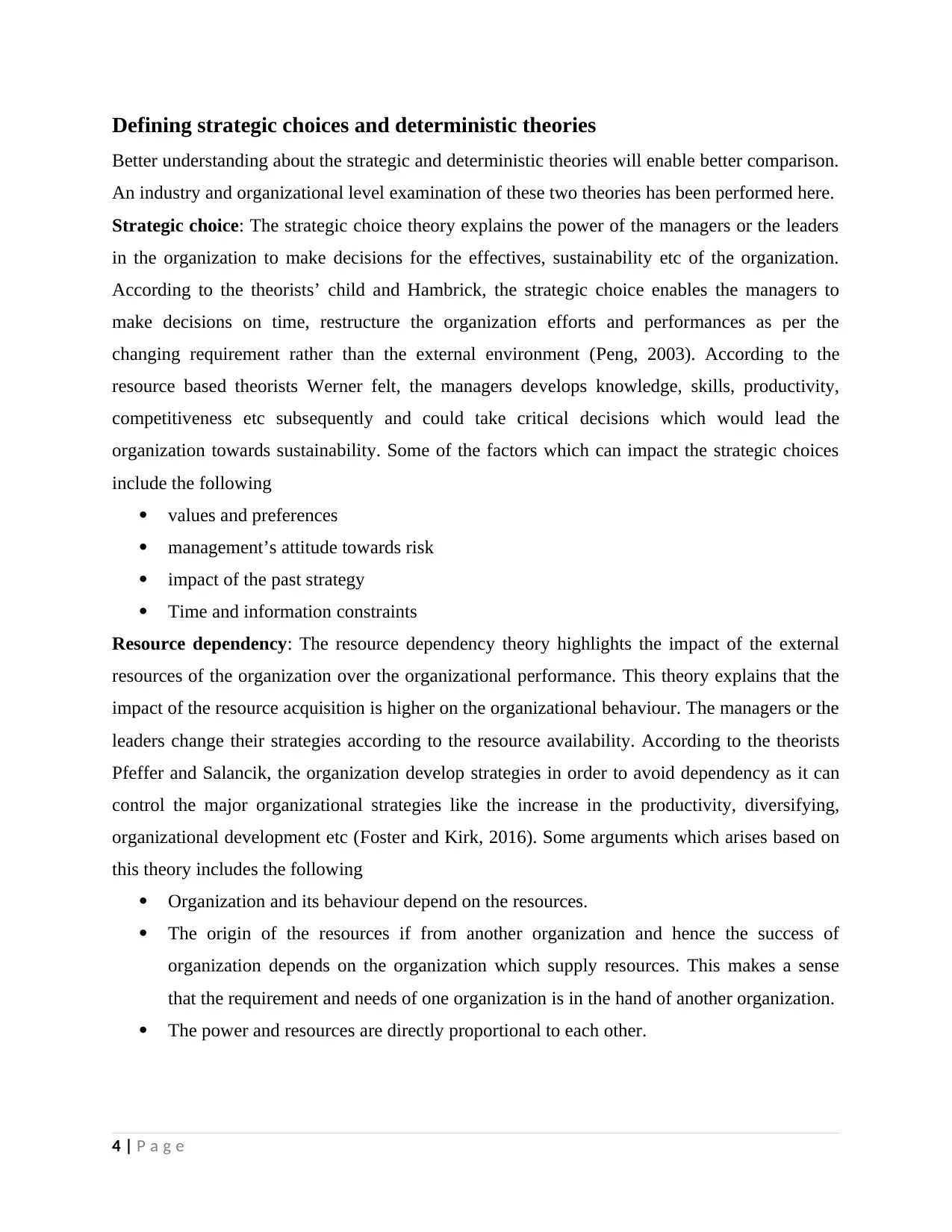
Defining strategic choices and deterministic theories
Better understanding about the strategic and deterministic theories will enable better comparison.
An industry and organizational level examination of these two theories has been performed here.
Strategic choice: The strategic choice theory explains the power of the managers or the leaders
in the organization to make decisions for the effectives, sustainability etc of the organization.
According to the theorists’ child and Hambrick, the strategic choice enables the managers to
make decisions on time, restructure the organization efforts and performances as per the
changing requirement rather than the external environment (Peng, 2003). According to the
resource based theorists Werner felt, the managers develops knowledge, skills, productivity,
competitiveness etc subsequently and could take critical decisions which would lead the
organization towards sustainability. Some of the factors which can impact the strategic choices
include the following
values and preferences
management’s attitude towards risk
impact of the past strategy
Time and information constraints
Resource dependency: The resource dependency theory highlights the impact of the external
resources of the organization over the organizational performance. This theory explains that the
impact of the resource acquisition is higher on the organizational behaviour. The managers or the
leaders change their strategies according to the resource availability. According to the theorists
Pfeffer and Salancik, the organization develop strategies in order to avoid dependency as it can
control the major organizational strategies like the increase in the productivity, diversifying,
organizational development etc (Foster and Kirk, 2016). Some arguments which arises based on
this theory includes the following
Organization and its behaviour depend on the resources.
The origin of the resources if from another organization and hence the success of
organization depends on the organization which supply resources. This makes a sense
that the requirement and needs of one organization is in the hand of another organization.
The power and resources are directly proportional to each other.
4 | P a g e
Better understanding about the strategic and deterministic theories will enable better comparison.
An industry and organizational level examination of these two theories has been performed here.
Strategic choice: The strategic choice theory explains the power of the managers or the leaders
in the organization to make decisions for the effectives, sustainability etc of the organization.
According to the theorists’ child and Hambrick, the strategic choice enables the managers to
make decisions on time, restructure the organization efforts and performances as per the
changing requirement rather than the external environment (Peng, 2003). According to the
resource based theorists Werner felt, the managers develops knowledge, skills, productivity,
competitiveness etc subsequently and could take critical decisions which would lead the
organization towards sustainability. Some of the factors which can impact the strategic choices
include the following
values and preferences
management’s attitude towards risk
impact of the past strategy
Time and information constraints
Resource dependency: The resource dependency theory highlights the impact of the external
resources of the organization over the organizational performance. This theory explains that the
impact of the resource acquisition is higher on the organizational behaviour. The managers or the
leaders change their strategies according to the resource availability. According to the theorists
Pfeffer and Salancik, the organization develop strategies in order to avoid dependency as it can
control the major organizational strategies like the increase in the productivity, diversifying,
organizational development etc (Foster and Kirk, 2016). Some arguments which arises based on
this theory includes the following
Organization and its behaviour depend on the resources.
The origin of the resources if from another organization and hence the success of
organization depends on the organization which supply resources. This makes a sense
that the requirement and needs of one organization is in the hand of another organization.
The power and resources are directly proportional to each other.
4 | P a g e
Paraphrase This Document
Need a fresh take? Get an instant paraphrase of this document with our AI Paraphraser
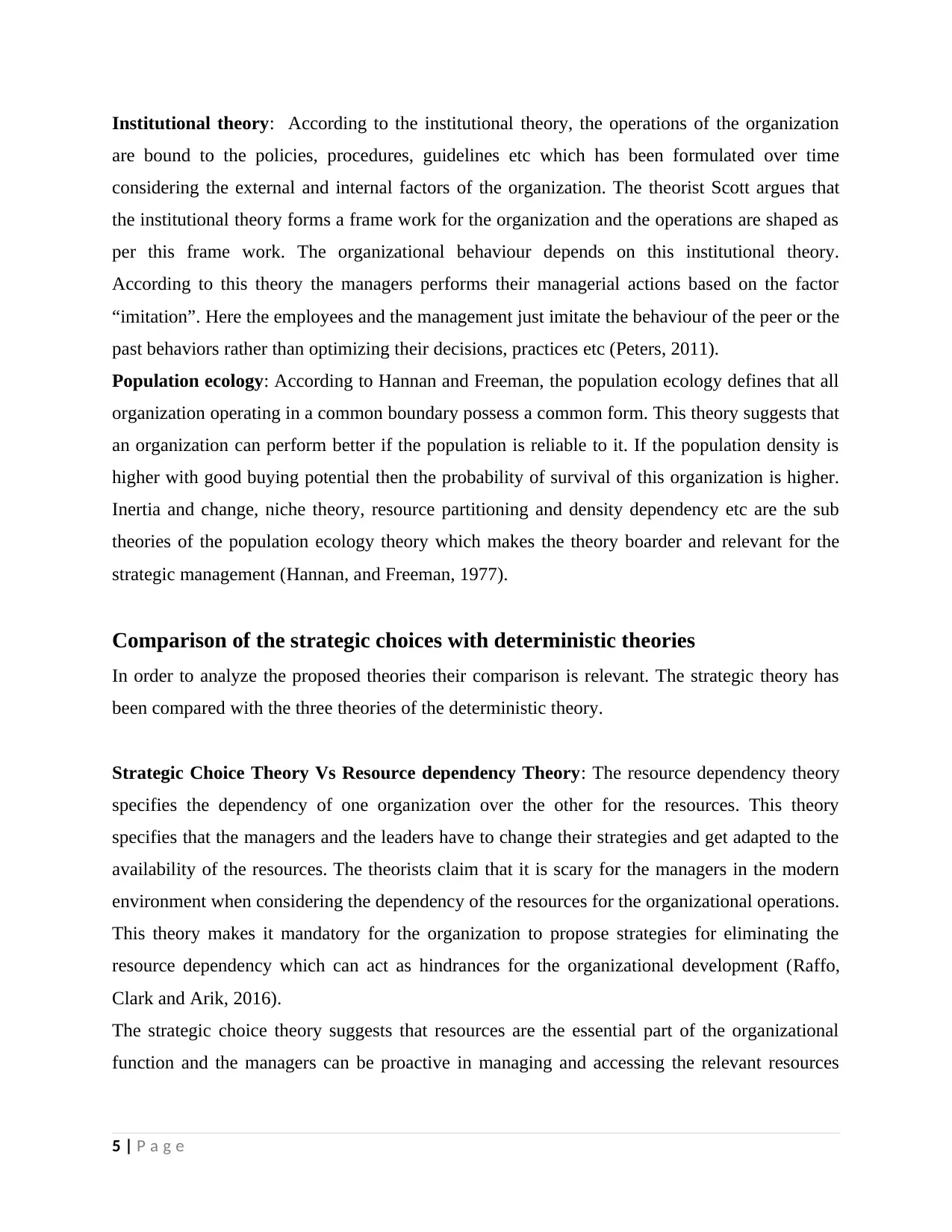
Institutional theory: According to the institutional theory, the operations of the organization
are bound to the policies, procedures, guidelines etc which has been formulated over time
considering the external and internal factors of the organization. The theorist Scott argues that
the institutional theory forms a frame work for the organization and the operations are shaped as
per this frame work. The organizational behaviour depends on this institutional theory.
According to this theory the managers performs their managerial actions based on the factor
“imitation”. Here the employees and the management just imitate the behaviour of the peer or the
past behaviors rather than optimizing their decisions, practices etc (Peters, 2011).
Population ecology: According to Hannan and Freeman, the population ecology defines that all
organization operating in a common boundary possess a common form. This theory suggests that
an organization can perform better if the population is reliable to it. If the population density is
higher with good buying potential then the probability of survival of this organization is higher.
Inertia and change, niche theory, resource partitioning and density dependency etc are the sub
theories of the population ecology theory which makes the theory boarder and relevant for the
strategic management (Hannan, and Freeman, 1977).
Comparison of the strategic choices with deterministic theories
In order to analyze the proposed theories their comparison is relevant. The strategic theory has
been compared with the three theories of the deterministic theory.
Strategic Choice Theory Vs Resource dependency Theory: The resource dependency theory
specifies the dependency of one organization over the other for the resources. This theory
specifies that the managers and the leaders have to change their strategies and get adapted to the
availability of the resources. The theorists claim that it is scary for the managers in the modern
environment when considering the dependency of the resources for the organizational operations.
This theory makes it mandatory for the organization to propose strategies for eliminating the
resource dependency which can act as hindrances for the organizational development (Raffo,
Clark and Arik, 2016).
The strategic choice theory suggests that resources are the essential part of the organizational
function and the managers can be proactive in managing and accessing the relevant resources
5 | P a g e
are bound to the policies, procedures, guidelines etc which has been formulated over time
considering the external and internal factors of the organization. The theorist Scott argues that
the institutional theory forms a frame work for the organization and the operations are shaped as
per this frame work. The organizational behaviour depends on this institutional theory.
According to this theory the managers performs their managerial actions based on the factor
“imitation”. Here the employees and the management just imitate the behaviour of the peer or the
past behaviors rather than optimizing their decisions, practices etc (Peters, 2011).
Population ecology: According to Hannan and Freeman, the population ecology defines that all
organization operating in a common boundary possess a common form. This theory suggests that
an organization can perform better if the population is reliable to it. If the population density is
higher with good buying potential then the probability of survival of this organization is higher.
Inertia and change, niche theory, resource partitioning and density dependency etc are the sub
theories of the population ecology theory which makes the theory boarder and relevant for the
strategic management (Hannan, and Freeman, 1977).
Comparison of the strategic choices with deterministic theories
In order to analyze the proposed theories their comparison is relevant. The strategic theory has
been compared with the three theories of the deterministic theory.
Strategic Choice Theory Vs Resource dependency Theory: The resource dependency theory
specifies the dependency of one organization over the other for the resources. This theory
specifies that the managers and the leaders have to change their strategies and get adapted to the
availability of the resources. The theorists claim that it is scary for the managers in the modern
environment when considering the dependency of the resources for the organizational operations.
This theory makes it mandatory for the organization to propose strategies for eliminating the
resource dependency which can act as hindrances for the organizational development (Raffo,
Clark and Arik, 2016).
The strategic choice theory suggests that resources are the essential part of the organizational
function and the managers can be proactive in managing and accessing the relevant resources
5 | P a g e
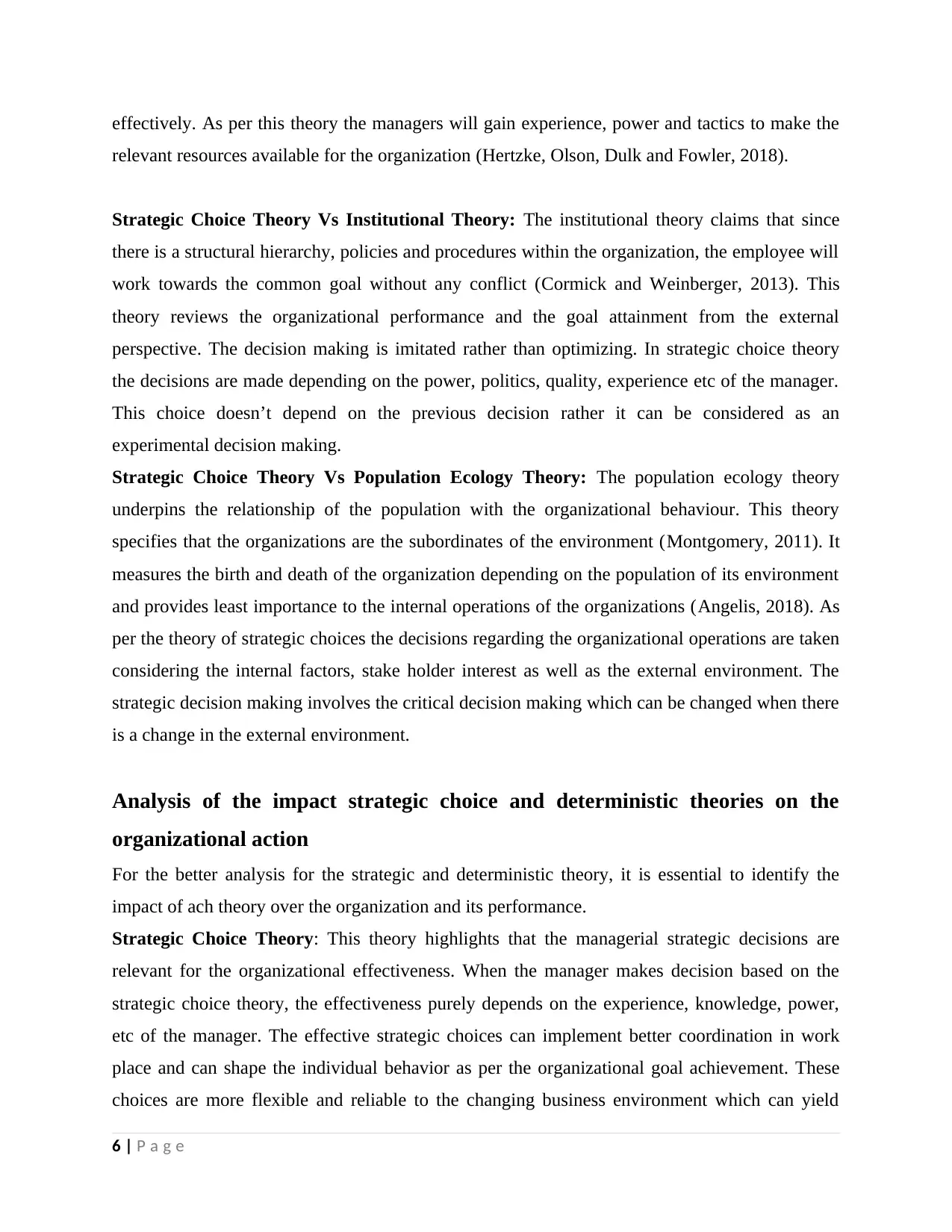
effectively. As per this theory the managers will gain experience, power and tactics to make the
relevant resources available for the organization (Hertzke, Olson, Dulk and Fowler, 2018).
Strategic Choice Theory Vs Institutional Theory: The institutional theory claims that since
there is a structural hierarchy, policies and procedures within the organization, the employee will
work towards the common goal without any conflict (Cormick and Weinberger, 2013). This
theory reviews the organizational performance and the goal attainment from the external
perspective. The decision making is imitated rather than optimizing. In strategic choice theory
the decisions are made depending on the power, politics, quality, experience etc of the manager.
This choice doesn’t depend on the previous decision rather it can be considered as an
experimental decision making.
Strategic Choice Theory Vs Population Ecology Theory: The population ecology theory
underpins the relationship of the population with the organizational behaviour. This theory
specifies that the organizations are the subordinates of the environment (Montgomery, 2011). It
measures the birth and death of the organization depending on the population of its environment
and provides least importance to the internal operations of the organizations (Angelis, 2018). As
per the theory of strategic choices the decisions regarding the organizational operations are taken
considering the internal factors, stake holder interest as well as the external environment. The
strategic decision making involves the critical decision making which can be changed when there
is a change in the external environment.
Analysis of the impact strategic choice and deterministic theories on the
organizational action
For the better analysis for the strategic and deterministic theory, it is essential to identify the
impact of ach theory over the organization and its performance.
Strategic Choice Theory: This theory highlights that the managerial strategic decisions are
relevant for the organizational effectiveness. When the manager makes decision based on the
strategic choice theory, the effectiveness purely depends on the experience, knowledge, power,
etc of the manager. The effective strategic choices can implement better coordination in work
place and can shape the individual behavior as per the organizational goal achievement. These
choices are more flexible and reliable to the changing business environment which can yield
6 | P a g e
relevant resources available for the organization (Hertzke, Olson, Dulk and Fowler, 2018).
Strategic Choice Theory Vs Institutional Theory: The institutional theory claims that since
there is a structural hierarchy, policies and procedures within the organization, the employee will
work towards the common goal without any conflict (Cormick and Weinberger, 2013). This
theory reviews the organizational performance and the goal attainment from the external
perspective. The decision making is imitated rather than optimizing. In strategic choice theory
the decisions are made depending on the power, politics, quality, experience etc of the manager.
This choice doesn’t depend on the previous decision rather it can be considered as an
experimental decision making.
Strategic Choice Theory Vs Population Ecology Theory: The population ecology theory
underpins the relationship of the population with the organizational behaviour. This theory
specifies that the organizations are the subordinates of the environment (Montgomery, 2011). It
measures the birth and death of the organization depending on the population of its environment
and provides least importance to the internal operations of the organizations (Angelis, 2018). As
per the theory of strategic choices the decisions regarding the organizational operations are taken
considering the internal factors, stake holder interest as well as the external environment. The
strategic decision making involves the critical decision making which can be changed when there
is a change in the external environment.
Analysis of the impact strategic choice and deterministic theories on the
organizational action
For the better analysis for the strategic and deterministic theory, it is essential to identify the
impact of ach theory over the organization and its performance.
Strategic Choice Theory: This theory highlights that the managerial strategic decisions are
relevant for the organizational effectiveness. When the manager makes decision based on the
strategic choice theory, the effectiveness purely depends on the experience, knowledge, power,
etc of the manager. The effective strategic choices can implement better coordination in work
place and can shape the individual behavior as per the organizational goal achievement. These
choices are more flexible and reliable to the changing business environment which can yield
6 | P a g e
⊘ This is a preview!⊘
Do you want full access?
Subscribe today to unlock all pages.

Trusted by 1+ million students worldwide
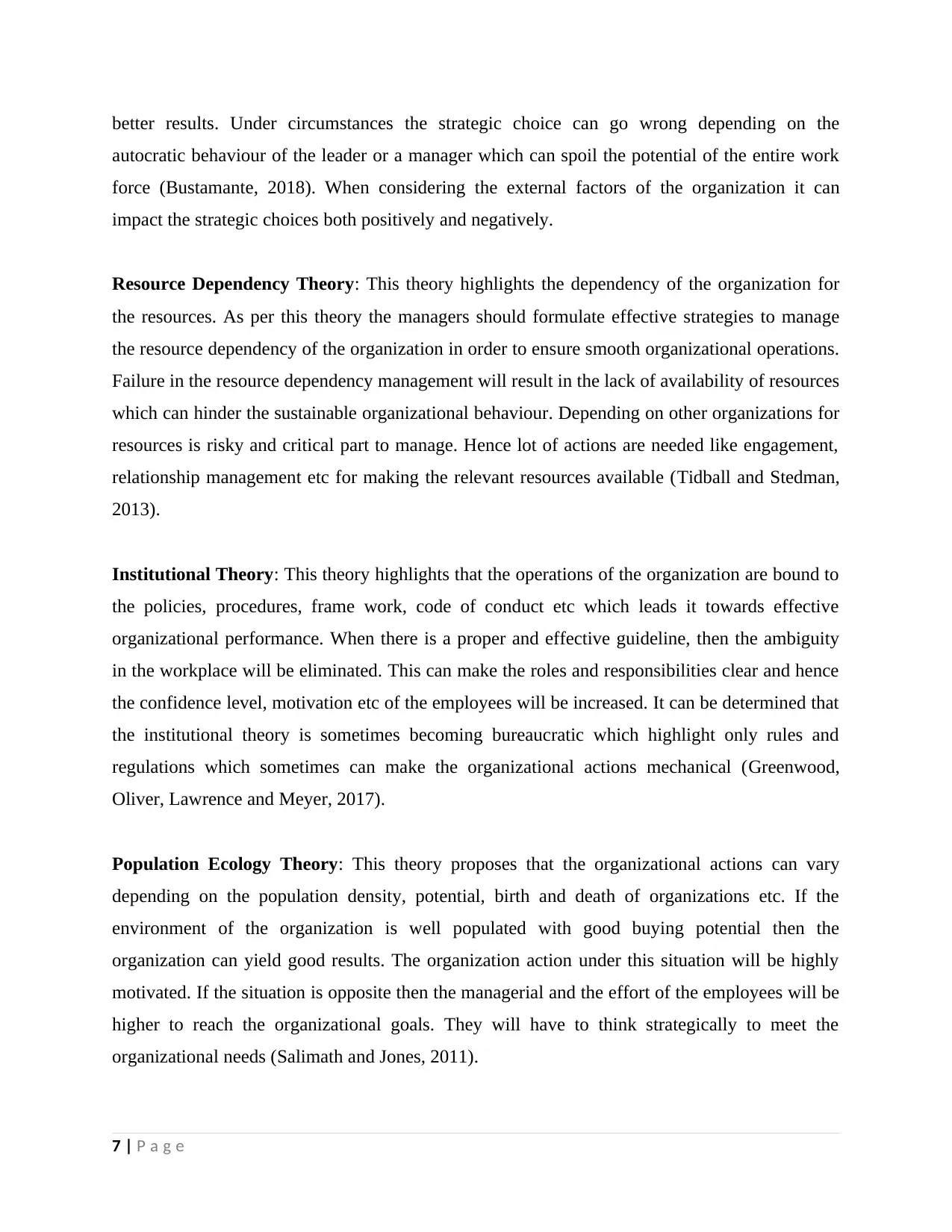
better results. Under circumstances the strategic choice can go wrong depending on the
autocratic behaviour of the leader or a manager which can spoil the potential of the entire work
force (Bustamante, 2018). When considering the external factors of the organization it can
impact the strategic choices both positively and negatively.
Resource Dependency Theory: This theory highlights the dependency of the organization for
the resources. As per this theory the managers should formulate effective strategies to manage
the resource dependency of the organization in order to ensure smooth organizational operations.
Failure in the resource dependency management will result in the lack of availability of resources
which can hinder the sustainable organizational behaviour. Depending on other organizations for
resources is risky and critical part to manage. Hence lot of actions are needed like engagement,
relationship management etc for making the relevant resources available (Tidball and Stedman,
2013).
Institutional Theory: This theory highlights that the operations of the organization are bound to
the policies, procedures, frame work, code of conduct etc which leads it towards effective
organizational performance. When there is a proper and effective guideline, then the ambiguity
in the workplace will be eliminated. This can make the roles and responsibilities clear and hence
the confidence level, motivation etc of the employees will be increased. It can be determined that
the institutional theory is sometimes becoming bureaucratic which highlight only rules and
regulations which sometimes can make the organizational actions mechanical (Greenwood,
Oliver, Lawrence and Meyer, 2017).
Population Ecology Theory: This theory proposes that the organizational actions can vary
depending on the population density, potential, birth and death of organizations etc. If the
environment of the organization is well populated with good buying potential then the
organization can yield good results. The organization action under this situation will be highly
motivated. If the situation is opposite then the managerial and the effort of the employees will be
higher to reach the organizational goals. They will have to think strategically to meet the
organizational needs (Salimath and Jones, 2011).
7 | P a g e
autocratic behaviour of the leader or a manager which can spoil the potential of the entire work
force (Bustamante, 2018). When considering the external factors of the organization it can
impact the strategic choices both positively and negatively.
Resource Dependency Theory: This theory highlights the dependency of the organization for
the resources. As per this theory the managers should formulate effective strategies to manage
the resource dependency of the organization in order to ensure smooth organizational operations.
Failure in the resource dependency management will result in the lack of availability of resources
which can hinder the sustainable organizational behaviour. Depending on other organizations for
resources is risky and critical part to manage. Hence lot of actions are needed like engagement,
relationship management etc for making the relevant resources available (Tidball and Stedman,
2013).
Institutional Theory: This theory highlights that the operations of the organization are bound to
the policies, procedures, frame work, code of conduct etc which leads it towards effective
organizational performance. When there is a proper and effective guideline, then the ambiguity
in the workplace will be eliminated. This can make the roles and responsibilities clear and hence
the confidence level, motivation etc of the employees will be increased. It can be determined that
the institutional theory is sometimes becoming bureaucratic which highlight only rules and
regulations which sometimes can make the organizational actions mechanical (Greenwood,
Oliver, Lawrence and Meyer, 2017).
Population Ecology Theory: This theory proposes that the organizational actions can vary
depending on the population density, potential, birth and death of organizations etc. If the
environment of the organization is well populated with good buying potential then the
organization can yield good results. The organization action under this situation will be highly
motivated. If the situation is opposite then the managerial and the effort of the employees will be
higher to reach the organizational goals. They will have to think strategically to meet the
organizational needs (Salimath and Jones, 2011).
7 | P a g e
Paraphrase This Document
Need a fresh take? Get an instant paraphrase of this document with our AI Paraphraser
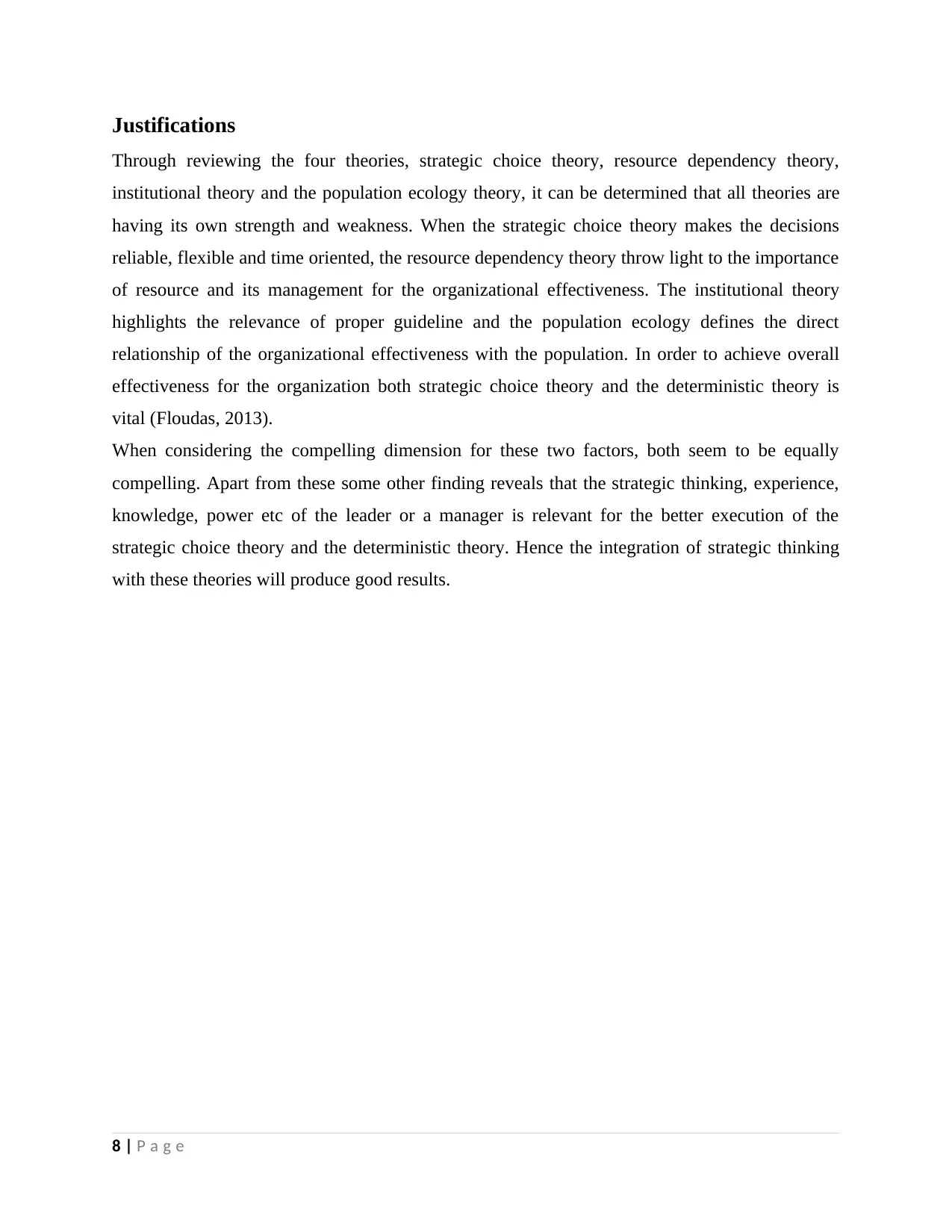
Justifications
Through reviewing the four theories, strategic choice theory, resource dependency theory,
institutional theory and the population ecology theory, it can be determined that all theories are
having its own strength and weakness. When the strategic choice theory makes the decisions
reliable, flexible and time oriented, the resource dependency theory throw light to the importance
of resource and its management for the organizational effectiveness. The institutional theory
highlights the relevance of proper guideline and the population ecology defines the direct
relationship of the organizational effectiveness with the population. In order to achieve overall
effectiveness for the organization both strategic choice theory and the deterministic theory is
vital (Floudas, 2013).
When considering the compelling dimension for these two factors, both seem to be equally
compelling. Apart from these some other finding reveals that the strategic thinking, experience,
knowledge, power etc of the leader or a manager is relevant for the better execution of the
strategic choice theory and the deterministic theory. Hence the integration of strategic thinking
with these theories will produce good results.
8 | P a g e
Through reviewing the four theories, strategic choice theory, resource dependency theory,
institutional theory and the population ecology theory, it can be determined that all theories are
having its own strength and weakness. When the strategic choice theory makes the decisions
reliable, flexible and time oriented, the resource dependency theory throw light to the importance
of resource and its management for the organizational effectiveness. The institutional theory
highlights the relevance of proper guideline and the population ecology defines the direct
relationship of the organizational effectiveness with the population. In order to achieve overall
effectiveness for the organization both strategic choice theory and the deterministic theory is
vital (Floudas, 2013).
When considering the compelling dimension for these two factors, both seem to be equally
compelling. Apart from these some other finding reveals that the strategic thinking, experience,
knowledge, power etc of the leader or a manager is relevant for the better execution of the
strategic choice theory and the deterministic theory. Hence the integration of strategic thinking
with these theories will produce good results.
8 | P a g e
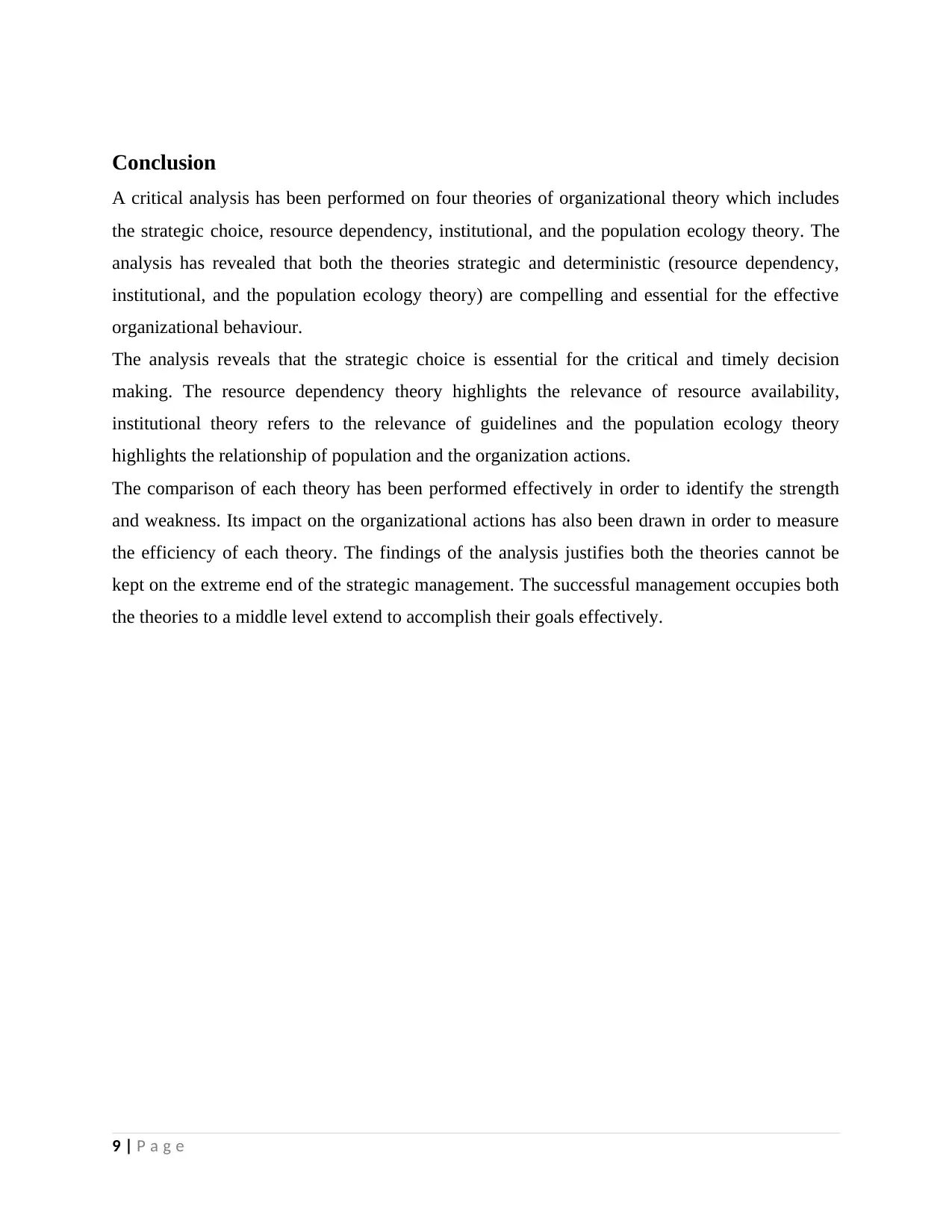
Conclusion
A critical analysis has been performed on four theories of organizational theory which includes
the strategic choice, resource dependency, institutional, and the population ecology theory. The
analysis has revealed that both the theories strategic and deterministic (resource dependency,
institutional, and the population ecology theory) are compelling and essential for the effective
organizational behaviour.
The analysis reveals that the strategic choice is essential for the critical and timely decision
making. The resource dependency theory highlights the relevance of resource availability,
institutional theory refers to the relevance of guidelines and the population ecology theory
highlights the relationship of population and the organization actions.
The comparison of each theory has been performed effectively in order to identify the strength
and weakness. Its impact on the organizational actions has also been drawn in order to measure
the efficiency of each theory. The findings of the analysis justifies both the theories cannot be
kept on the extreme end of the strategic management. The successful management occupies both
the theories to a middle level extend to accomplish their goals effectively.
9 | P a g e
A critical analysis has been performed on four theories of organizational theory which includes
the strategic choice, resource dependency, institutional, and the population ecology theory. The
analysis has revealed that both the theories strategic and deterministic (resource dependency,
institutional, and the population ecology theory) are compelling and essential for the effective
organizational behaviour.
The analysis reveals that the strategic choice is essential for the critical and timely decision
making. The resource dependency theory highlights the relevance of resource availability,
institutional theory refers to the relevance of guidelines and the population ecology theory
highlights the relationship of population and the organization actions.
The comparison of each theory has been performed effectively in order to identify the strength
and weakness. Its impact on the organizational actions has also been drawn in order to measure
the efficiency of each theory. The findings of the analysis justifies both the theories cannot be
kept on the extreme end of the strategic management. The successful management occupies both
the theories to a middle level extend to accomplish their goals effectively.
9 | P a g e
⊘ This is a preview!⊘
Do you want full access?
Subscribe today to unlock all pages.

Trusted by 1+ million students worldwide
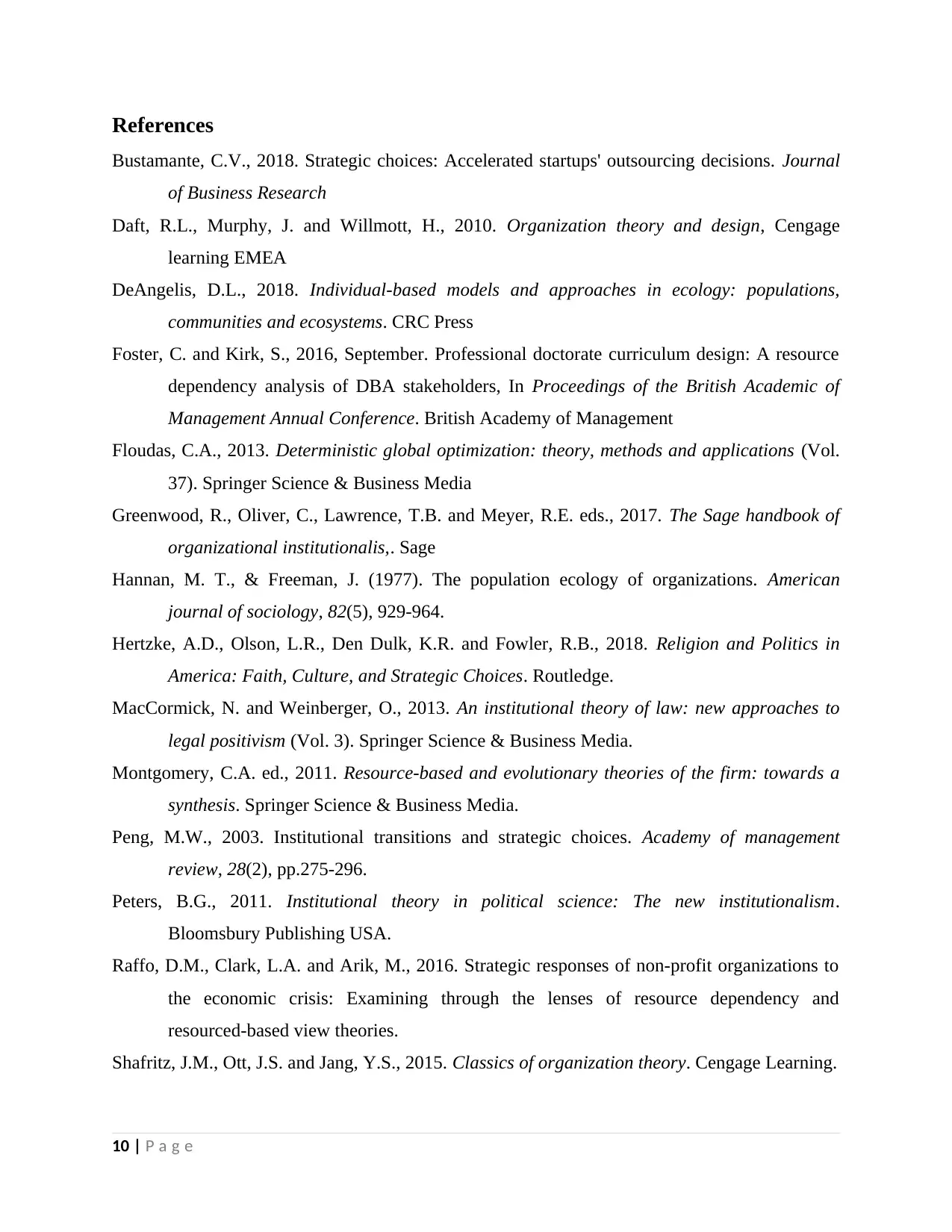
References
Bustamante, C.V., 2018. Strategic choices: Accelerated startups' outsourcing decisions. Journal
of Business Research
Daft, R.L., Murphy, J. and Willmott, H., 2010. Organization theory and design, Cengage
learning EMEA
DeAngelis, D.L., 2018. Individual-based models and approaches in ecology: populations,
communities and ecosystems. CRC Press
Foster, C. and Kirk, S., 2016, September. Professional doctorate curriculum design: A resource
dependency analysis of DBA stakeholders, In Proceedings of the British Academic of
Management Annual Conference. British Academy of Management
Floudas, C.A., 2013. Deterministic global optimization: theory, methods and applications (Vol.
37). Springer Science & Business Media
Greenwood, R., Oliver, C., Lawrence, T.B. and Meyer, R.E. eds., 2017. The Sage handbook of
organizational institutionalis,. Sage
Hannan, M. T., & Freeman, J. (1977). The population ecology of organizations. American
journal of sociology, 82(5), 929-964.
Hertzke, A.D., Olson, L.R., Den Dulk, K.R. and Fowler, R.B., 2018. Religion and Politics in
America: Faith, Culture, and Strategic Choices. Routledge.
MacCormick, N. and Weinberger, O., 2013. An institutional theory of law: new approaches to
legal positivism (Vol. 3). Springer Science & Business Media.
Montgomery, C.A. ed., 2011. Resource-based and evolutionary theories of the firm: towards a
synthesis. Springer Science & Business Media.
Peng, M.W., 2003. Institutional transitions and strategic choices. Academy of management
review, 28(2), pp.275-296.
Peters, B.G., 2011. Institutional theory in political science: The new institutionalism.
Bloomsbury Publishing USA.
Raffo, D.M., Clark, L.A. and Arik, M., 2016. Strategic responses of non-profit organizations to
the economic crisis: Examining through the lenses of resource dependency and
resourced-based view theories.
Shafritz, J.M., Ott, J.S. and Jang, Y.S., 2015. Classics of organization theory. Cengage Learning.
10 | P a g e
Bustamante, C.V., 2018. Strategic choices: Accelerated startups' outsourcing decisions. Journal
of Business Research
Daft, R.L., Murphy, J. and Willmott, H., 2010. Organization theory and design, Cengage
learning EMEA
DeAngelis, D.L., 2018. Individual-based models and approaches in ecology: populations,
communities and ecosystems. CRC Press
Foster, C. and Kirk, S., 2016, September. Professional doctorate curriculum design: A resource
dependency analysis of DBA stakeholders, In Proceedings of the British Academic of
Management Annual Conference. British Academy of Management
Floudas, C.A., 2013. Deterministic global optimization: theory, methods and applications (Vol.
37). Springer Science & Business Media
Greenwood, R., Oliver, C., Lawrence, T.B. and Meyer, R.E. eds., 2017. The Sage handbook of
organizational institutionalis,. Sage
Hannan, M. T., & Freeman, J. (1977). The population ecology of organizations. American
journal of sociology, 82(5), 929-964.
Hertzke, A.D., Olson, L.R., Den Dulk, K.R. and Fowler, R.B., 2018. Religion and Politics in
America: Faith, Culture, and Strategic Choices. Routledge.
MacCormick, N. and Weinberger, O., 2013. An institutional theory of law: new approaches to
legal positivism (Vol. 3). Springer Science & Business Media.
Montgomery, C.A. ed., 2011. Resource-based and evolutionary theories of the firm: towards a
synthesis. Springer Science & Business Media.
Peng, M.W., 2003. Institutional transitions and strategic choices. Academy of management
review, 28(2), pp.275-296.
Peters, B.G., 2011. Institutional theory in political science: The new institutionalism.
Bloomsbury Publishing USA.
Raffo, D.M., Clark, L.A. and Arik, M., 2016. Strategic responses of non-profit organizations to
the economic crisis: Examining through the lenses of resource dependency and
resourced-based view theories.
Shafritz, J.M., Ott, J.S. and Jang, Y.S., 2015. Classics of organization theory. Cengage Learning.
10 | P a g e
Paraphrase This Document
Need a fresh take? Get an instant paraphrase of this document with our AI Paraphraser
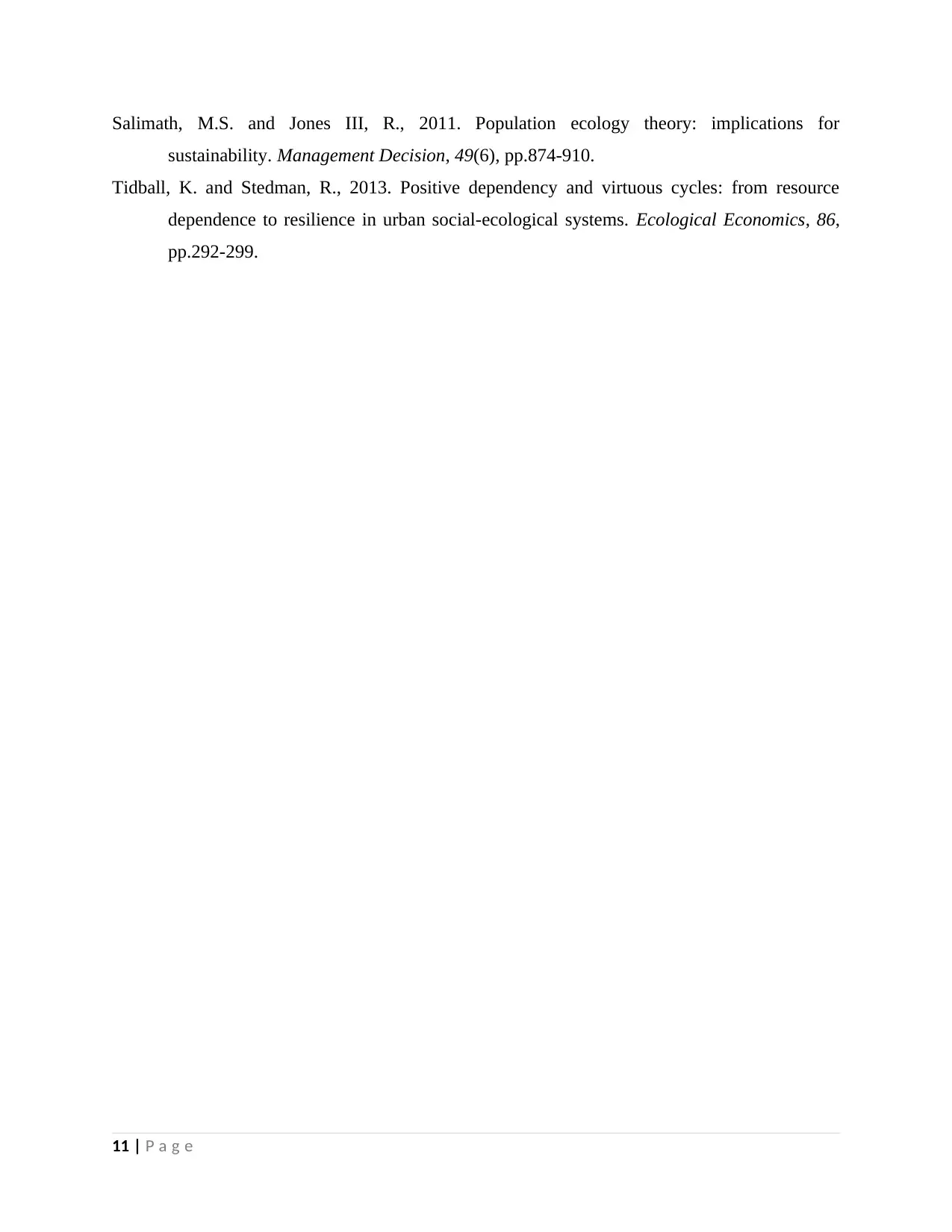
Salimath, M.S. and Jones III, R., 2011. Population ecology theory: implications for
sustainability. Management Decision, 49(6), pp.874-910.
Tidball, K. and Stedman, R., 2013. Positive dependency and virtuous cycles: from resource
dependence to resilience in urban social-ecological systems. Ecological Economics, 86,
pp.292-299.
11 | P a g e
sustainability. Management Decision, 49(6), pp.874-910.
Tidball, K. and Stedman, R., 2013. Positive dependency and virtuous cycles: from resource
dependence to resilience in urban social-ecological systems. Ecological Economics, 86,
pp.292-299.
11 | P a g e
1 out of 11
Related Documents
Your All-in-One AI-Powered Toolkit for Academic Success.
+13062052269
info@desklib.com
Available 24*7 on WhatsApp / Email
![[object Object]](/_next/static/media/star-bottom.7253800d.svg)
Unlock your academic potential
Copyright © 2020–2026 A2Z Services. All Rights Reserved. Developed and managed by ZUCOL.




